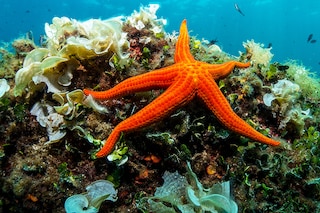Global warming could benefit coral-eating starfish
Crown-of-thorns starfish, which are predators of coral reefs and highly resistant to marine heatwaves, could proliferate


Global warming is exacerbating coral bleaching. But, according to Australian scientists, it could also encourage the proliferation of crown-of-thorns starfish, which are predators of coral reefs and highly resistant to marine heatwaves.
Crown-of-thorns starfish (Acanthaster) are often referred to as corals" worst enemies. As juveniles, these starfish are herbivores. But when they reach adulthood, they become veritable predators that devour coral reefs. "The juveniles have potential for long-term persistence as herbivores as they wait for live coral to recover before becoming coral predators," explain marine biologists from Australia"s University of Sydney. They tested the resistance of juvenile crown-of-thorns starfish by exposing them to heat stress scenarios designed to mimic the effect of marine heatwaves, reflecting the conditions that cause coral bleaching and mortality.
For the starfish experiments, these conditions were created using two aluminum blocks mounted in parallel to maintain stable temperatures, with hot and cold water inlets at each end. Three heat-wave scenarios were tested: 28°C, 29°C and 30°C. The control temperature was 27°C, the maximum mean summer sea surface temperature to which Acanthaster sea stars are exposed in the southern Great Barrier Reef. In the same region, the threshold for coral bleaching is 28.3°C. The starfish showed a much greater tolerance to heatwave conditions than coral, the study notes.
"This is an important finding that has implications for understanding the impacts of climate change on marine ecosystems," the scientist says. In fact, warming waters could indeed benefit these starfish, Professor Byrne suggests, because "the increase in the amount of their rubble habitat, generated by coral bleaching and mortality, allows their numbers to build over time."
According to data from the European monitoring program Copernicus, the surface temperature of the oceans in 2023 reached 20.96°C on July 30, beating the previous record of 20.95°C, set in March 2016. Ocean warming has a direct impact on coral survival. In the Mediterranean, several species have disappeared (notably gorgonian corals), and the Great Barrier Reef in Australia continues to experience bleaching. According to a report published in May 2022 by the Australian government, 91% of the reef"s corals were damaged by bleaching after a prolonged summer heatwave.
First Published: Oct 21, 2023, 08:07
Subscribe Now